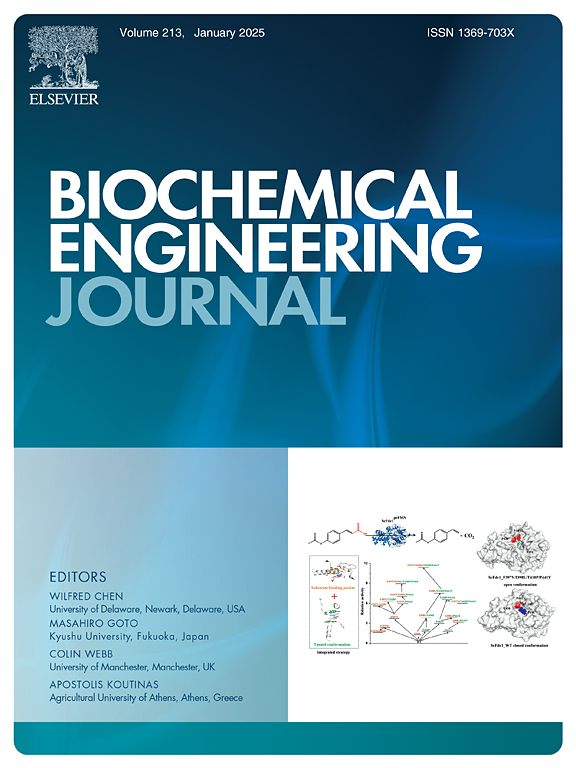Impact of stringent stress response and amino acid supplementation on recombinant protein production in Escherichia coli
IF 3.7
3区 生物学
Q2 BIOTECHNOLOGY & APPLIED MICROBIOLOGY
引用次数: 0
Abstract
The metabolic response of Escherichia coli BL21 DE3 strains upon amino acid supplementation and stringent stress was examined to assess its effects on growth, protein production, metabolic efficiency, and cellular stress. In the absence of amino acids, E. coli prioritized amino acid synthesis, essential for recombinant protein production. Supplementation led to faster growth, higher cell densities, and reduced acetate accumulation, indicating improved metabolic balance. Proteomic analysis revealed notable changes in protein abundance during the early log and post-induction mid-log phases, with supplemented cultures showing enhanced metabolic capacity and reduced stress levels. Gene expression analysis demonstrated that amino acid availability downregulated stress response genes and upregulated genes associated with nutrient uptake and metabolism, boosting growth and productivity. Specifically, genes lldR, ydgR, tppB, and yhhN were upregulated, while adiA and ydeI were downregulated, reflecting better metabolic conditions. Stringent response analysis showed elevated (p)ppGpp levels and increased activities of SpoT and RelA without supplementation, indicative of nutrient stress. Supplementation lowered these stress markers, fostering a favourable metabolic state. The study underscores the importance of amino acid supplementation for optimizing biomass production and recombinant protein yields, offering insights into E. coli physiology and strategies for metabolic engineering.
严格应激反应和氨基酸补充对大肠杆菌重组蛋白生产的影响
研究了大肠杆菌BL21 DE3菌株对氨基酸补充和严格应激的代谢反应,以评估其对生长、蛋白质产量、代谢效率和细胞应激的影响。在缺乏氨基酸的情况下,大肠杆菌优先合成重组蛋白所必需的氨基酸。补充后,生长更快,细胞密度更高,醋酸盐积累减少,表明代谢平衡得到改善。蛋白质组学分析显示,在伐木早期和诱导后的伐木中期,蛋白质丰度发生了显著变化,补充的培养物显示出代谢能力增强和应激水平降低。基因表达分析表明,氨基酸可用性下调应激反应基因,上调与营养吸收和代谢相关的基因,促进生长和生产力。具体来说,lldR、ydgR、tppB和yhhN基因上调,而adiA和ydeI基因下调,反映了更好的代谢条件。严格的响应分析显示,在不补充营养的情况下,ppGpp水平升高,SpoT和RelA活性增加,表明营养胁迫。补充剂降低了这些应激标志物,促进了有利的代谢状态。该研究强调了氨基酸补充对优化生物量生产和重组蛋白产量的重要性,为大肠杆菌的生理学和代谢工程策略提供了见解。
本文章由计算机程序翻译,如有差异,请以英文原文为准。
求助全文
约1分钟内获得全文
求助全文
来源期刊

Biochemical Engineering Journal
工程技术-工程:化工
CiteScore
7.10
自引率
5.10%
发文量
380
审稿时长
34 days
期刊介绍:
The Biochemical Engineering Journal aims to promote progress in the crucial chemical engineering aspects of the development of biological processes associated with everything from raw materials preparation to product recovery relevant to industries as diverse as medical/healthcare, industrial biotechnology, and environmental biotechnology.
The Journal welcomes full length original research papers, short communications, and review papers* in the following research fields:
Biocatalysis (enzyme or microbial) and biotransformations, including immobilized biocatalyst preparation and kinetics
Biosensors and Biodevices including biofabrication and novel fuel cell development
Bioseparations including scale-up and protein refolding/renaturation
Environmental Bioengineering including bioconversion, bioremediation, and microbial fuel cells
Bioreactor Systems including characterization, optimization and scale-up
Bioresources and Biorefinery Engineering including biomass conversion, biofuels, bioenergy, and optimization
Industrial Biotechnology including specialty chemicals, platform chemicals and neutraceuticals
Biomaterials and Tissue Engineering including bioartificial organs, cell encapsulation, and controlled release
Cell Culture Engineering (plant, animal or insect cells) including viral vectors, monoclonal antibodies, recombinant proteins, vaccines, and secondary metabolites
Cell Therapies and Stem Cells including pluripotent, mesenchymal and hematopoietic stem cells; immunotherapies; tissue-specific differentiation; and cryopreservation
Metabolic Engineering, Systems and Synthetic Biology including OMICS, bioinformatics, in silico biology, and metabolic flux analysis
Protein Engineering including enzyme engineering and directed evolution.
 求助内容:
求助内容: 应助结果提醒方式:
应助结果提醒方式:


